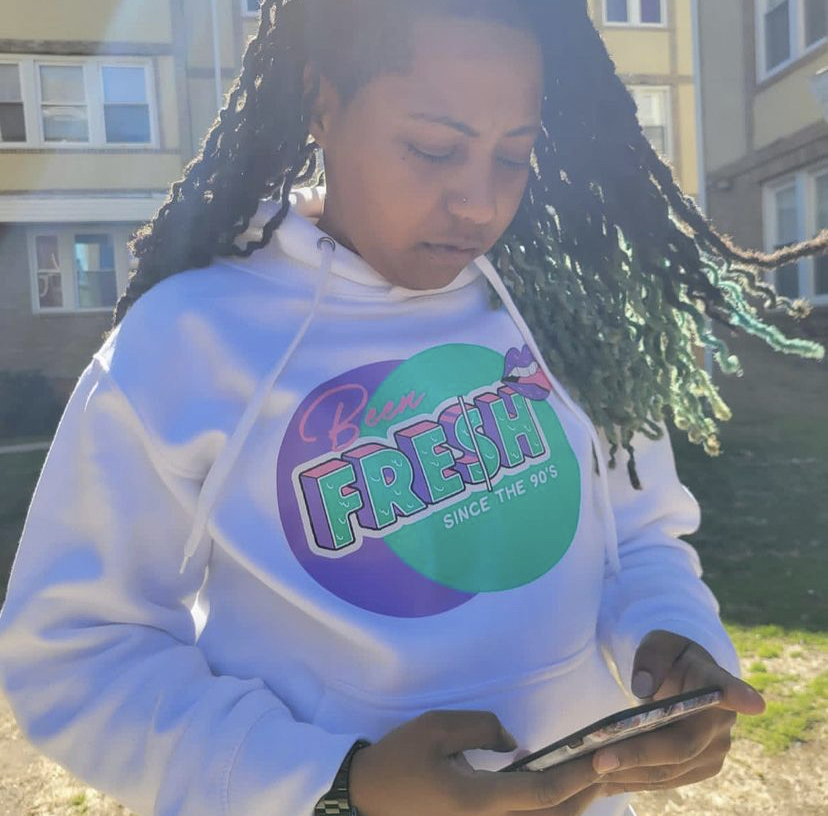If you own a business, you need to read this article. More importantly, you need to ask yourself, “Do I need a trademark?” And the answer would be, in most cases, whether you have a big or small business or a personal brand, YES!
That’s why Radiance W. Harris Esq, a Maryland-based award-winning trademark attorney, makes it her business to inform and educate business owners about the importance of protecting their business, product, and services names, among other things, with trademarks. It’s her specialty and she is passionate about it. In addition to being an attorney, she is also the bestselling author of the book, Trademark Like A Boss: The Ultimate Step-By-Step Guide to Protecting Your Brand, which guides readers through the U.S. federal trademark registration process; it has been an amazing help for so many.
Radiance’s prior experience working at one of the world’s largest law firms prepared and equipped her to start her law firm, Radiance IP Law. And it is evident by the many businesses she has helped to secure their trademarks. Her success is undeniable, and she continues to grow.
Among many accolades, Radiance has been recognized as a Rising Star for Intellectual Property by Super Lawyers in Maryland and Washington, D.C. She has also been recognized as one of the Nation’s Best Advocates: 40 Lawyers Under 40. In addition, she has been featured as a legal expert in Forbes and The New York Times. As you can see, she knows her stuff.
Here’s what Radiance W. Harris Esq. has to say about trademarks, and why you need them for your brand and business.
Tell everyone a little bit about yourself and why you wanted to be a trademark lawyer?
I’m Radiance Harris and I’m the founder and managing attorney of Radiance IP Law. I help businesses protect, monetize, and grow profitable brands with trademarks. I’ve practiced trademark law for roughly 13 years now. And I got into trademark law while working as a summer associate at a large law firm during law school. I dibbled and dabbled in different practice areas including everything from real estate, corporate, litigation, bankruptcy, trademarks, and copyrights. I realized from that experience that I really loved trademarks; I think it stemmed from my love for words. I was an English Literature major in college.
So, that’s where it started. Before my third and final year of law school, I was offered a position to come on as a full-time associate in the Trademark, Copyright, and Media Practice Group at that law firm.
Many people interchange the terms copyright, patent, and trademark. Can you explain the differences between them and how to determine which one a person needs?
That’s a great question. The overall umbrella term is intellectual property. Under this overarching umbrella, there are trademarks, copyrights, patents, and trade secrets. So, there are four different types of intellectual property. Trademarks protect your brand. Anything that serves as a source identifier, including your business name, your product or service name, your logo, and taglines, among other things, would be considered trademarks. Copyright protects your content. Any original works of authorship in tangible form would be considered copyright. That would include written materials, photographs, artwork, music, and videos. Then, you have patents, which protect inventions. And then lastly, you have trade secrets, which protect anything that is proprietary or is meant to be kept a secret in your business. It can be formulas, recipes, know-hows, business and financial information, methods, plans, or anything of immense value. Generally speaking, all businesses, regardless of their industry or size, have trademarks and copyright, which should be protected. The majority of businesses also have trade secrets. It’s like your unique way of doing business―your “secret sauce” and competitive edge. However, not all businesses have inventions, which may need patent protection, so that might not apply to your business.
As you see, all businesses have intellectual property. It’s important to identify that intellectual property and secure proper legal protections. An intellectual property attorney like myself helps businesses identify what intellectual property they can and should be protecting and handle the legal processes on their behalf.
Why is it important for a business or brand to trademark its name?
A trademark establishes legal rights and ownership, and the right to use a name, logo, or tagline nationwide. When starting a new business, people tend to establish their LLCs and then grab a bunch of domain names along with social media handles. However, doing these things doesn’t establish trademark rights. So, you don’t legally own your name, logo, or tagline without trademark protection.
When you pursue federal trademark protection with the U.S. Patent and Trademark Office, that gives you a legal right to use that name. This means that you have exclusive nationwide rights to use that name in connection with your products and services. It prevents a competitor from using an identical or similar name to yours. So, if you found out that someone was infringing on your trademark rights, you would have legal recourse to stop them.
Without trademark protection, you have no legal recourse against competitors using your identical or similar name to sell competing products or services.
Say an influencer has been using their name as their brand name for 10 years but hasn’t trademarked it, and then another company or brand comes along with the same name and trademarks it, what rights does the first person have?
So, when you’re using a name without pursuing U.S. Federal trademark protection, at a minimum, you have common law trademark rights. Common law trademark rights are established based on actual use, but they’re only limited to the geographic region where you are headquartered. So, say you’re based in Maryland, and you’re using a name without U.S. Federal trademark protection, you have common trademark rights in Maryland only.
Even though your presence and influence may span national and international borders, you are only able to prevent a competitor from using an identical or similar name in the state where you are headquartered. When you secure U.S. federal trademark registration, you can prevent someone from using your name across all 50 states, regardless of whether you actually step foot in any other state.
Tell everyone about your practice and all you do? You’re also an author. Tell us about your book.
At Radiance IP Law, we help emerging businesses establish and protect their trademark. We handle everything from securing trademark registrations from the U.S. Patent and Trademark Office, enforcement of trademark rights, as well as maintenance of those trademark rights. In addition, we also help clients with copyright protection, if necessary, as well as licensing.
As far as my bestselling book, Trademark Like a Boss: The Ultimate Step-By-Step Guide to Protecting Your Brand. It’s a step-by-step guide to protecting your brand. I wrote the book in 2020 during the beginning of the pandemic. I was divinely led to writing it. I have all of this knowledge about trademarks and I wanted to be able to help educate business owners about the importance and value of protecting their trademarks. After reading the book, if they decided that they want to do the trademark registration process themselves because maybe they can’t afford an attorney like me right now, they may do so. But if they read it, and say heck no, I don’t want to do all that, let me hire Radiance IP Law to handle the process for me, they have that option as well. The whole purpose of the book is to inform business owners about what a trademark is, why they need to protect it, and how they can do it step-by-step with the U.S. Patent and Trademark Office in easy-to-read plain English.
As a trademark lawyer, what are some things that can go wrong if a business or brand doesn’t get a trademark?
So, a few things could go wrong. One thing is not having any legal recourse against a third party after finding out that a competitor in another state has started using a competing name to sell a competing product or service. Another thing, you could be committing trademark infringement against a third party because a lot of business owners just start using a business or brand name without conducting a proper trademark search to ensure that they are not infringing on someone’s prior trademark rights. You could also receive a cease-and-desist letter and have to rebrand after building your brand and business for “x” number of years, or you can get sued.
What is the process to obtain a trademark and what do you think people need to understand about trademarks that they’re probably not aware of?
Filing a trademark is not the same thing as filing for an LLC with the Secretary of State. When you file your paperwork with the Secretary of State, your LLC might be finalized in three days. With the U.S. federal trademark registration, the process can take anywhere from 12-14 months, or longer. So, it’s a tedious and lengthy process. Typically, the smart way to go about the process is to first conduct an initial trademark search to make sure there is no infringement.
Once you’ve established that your proposed mark is available for your use and registration as a trademark, then proceed with the U.S. federal trademark process. But there’s a lot that it entails, identifying the correct trademark classes and goods/services description, properly completing and filing the application, and handling all the other issues that may arise in the process, such as office actions or challenges. Also, you will need to file a Statement of Use to show proof of trademark use before obtaining a registration if you filed an application based on an intent to use. There are a lot of nuisances in trademark law that a layperson would not understand or be aware of. So, there’s a reason why people like myself and others specialize in trademark law.
Should all businesses get a trademark or are there some businesses where it’s not needed?
Yes, all businesses should protect their trademarks.
What’s next for you?
The main focus is to continue to grow and scale Radiance IP Law and to continue to serve the small and emerging businesses to give them access to high-quality trademark services.
The Trademark Like A Boss brand is our educational brand. It serves to educate people about the importance of trademarks. So, I have my Trademark Like A Boss book. I have my Trademark Like A Boss signature training program. I also have my Trademark Like A Boss weekly video podcast. All these are used to serve and educate business owners about trademarks. So, I’m looking to make as huge of an impact as I possibly can.
10) How can people reach or follow you?
You can buy a copy of her book here: book.radianceiplaw.com
Her podcast is here on YouTube. Catch up on season one before season two starts.
Catch up with her here: Website │Facebook │Instagram │Linkedin
Photo credit: Amanda Ghobadi, The Branding Babe
Writer, Debbie Stokes is a contributing writer. Follow her on Instagram @iamdebbiestokes
Follow Us On Social Media!




